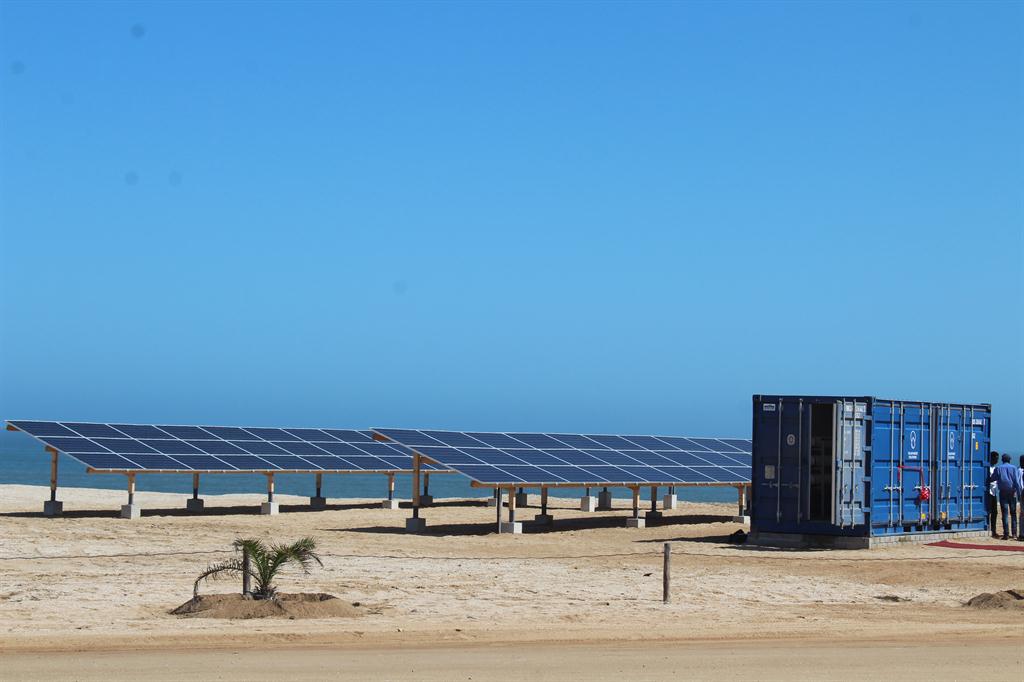A world first for Namibia
Funded by a Finnish university, the Unam's Henties Bay campus has the first solar-powered desalination plant in the world.
The world's first seawater desalination plant to be powered by solar energy was inaugurated by Namibia's founding president Sam Nujoma at the University of Namibia (Unam) campus at Henties Bay on Friday.
The €200 000 (N$3.234 million) plant, which was built in Finland and shipped to Namibia, is a joint initiative between Unam and Turku University in Finland. The project was funded by the University of Turku.
Speaking at the event, Unam patron Sam Nujoma said the plant would help address Namibia's growing water supply problem.
“Our water supply is diminishing year after year due to the adverse effects of climate change already felt in southern Africa and many parts of Africa. Namibia stands out as one of the countries that will be most hit by the effects of climate change,” the former president said.
“As you know, about 80% of Namibia relies on groundwater as a major water source, but due to climate change, our country could experience prolonged years of drought in the future that could deplete all groundwater and surface water resources.
“Yet, Namibia is blessed with about 1 500 kilometres of coastline along the Atlantic Ocean that provides us with an unlimited water resource. The time is now to abstract seawater and desalinate it for human consumption,” Nujoma said in his keynote address.
According to Nujoma, seawater desalination could address Namibia's food security too, as it could provide water for irrigation and livestock farms.
“I urge the ministry of agriculture, water and forestry to embrace the concept of desert agriculture and use desalinated water to convert our desert into large-scale green schemes for crop production or animal husbandry.
“A solar-based desalination plant like the one I am launching here today can be used to desalinate water for crop irrigation or animal consumption in the rural communities as there are many isolated rural communities in Namibia who have boreholes that only produce saline or brackish water.”
Unam has allocated two hectares of land that will be used for crop production and will make use of desalinated seawater for drip irrigation.
Nujoma also appealed to the Namibian government to consider the implementation of large-scale seawater desalination as a priority national project.
Furthermore, he urged the government to adopt seawater desalination using renewable energy as the principal source of bulk water supply in Namibia in the medium to long term.
Over 3 000 litres of water per day can be produced by the plant.
The project has received environmental clearance and the ministry of agriculture, water and forestry has issued the University of Namibia with a permit to abstract water from the Atlantic Ocean for research purposes.
ADOLF KAURE
The €200 000 (N$3.234 million) plant, which was built in Finland and shipped to Namibia, is a joint initiative between Unam and Turku University in Finland. The project was funded by the University of Turku.
Speaking at the event, Unam patron Sam Nujoma said the plant would help address Namibia's growing water supply problem.
“Our water supply is diminishing year after year due to the adverse effects of climate change already felt in southern Africa and many parts of Africa. Namibia stands out as one of the countries that will be most hit by the effects of climate change,” the former president said.
“As you know, about 80% of Namibia relies on groundwater as a major water source, but due to climate change, our country could experience prolonged years of drought in the future that could deplete all groundwater and surface water resources.
“Yet, Namibia is blessed with about 1 500 kilometres of coastline along the Atlantic Ocean that provides us with an unlimited water resource. The time is now to abstract seawater and desalinate it for human consumption,” Nujoma said in his keynote address.
According to Nujoma, seawater desalination could address Namibia's food security too, as it could provide water for irrigation and livestock farms.
“I urge the ministry of agriculture, water and forestry to embrace the concept of desert agriculture and use desalinated water to convert our desert into large-scale green schemes for crop production or animal husbandry.
“A solar-based desalination plant like the one I am launching here today can be used to desalinate water for crop irrigation or animal consumption in the rural communities as there are many isolated rural communities in Namibia who have boreholes that only produce saline or brackish water.”
Unam has allocated two hectares of land that will be used for crop production and will make use of desalinated seawater for drip irrigation.
Nujoma also appealed to the Namibian government to consider the implementation of large-scale seawater desalination as a priority national project.
Furthermore, he urged the government to adopt seawater desalination using renewable energy as the principal source of bulk water supply in Namibia in the medium to long term.
Over 3 000 litres of water per day can be produced by the plant.
The project has received environmental clearance and the ministry of agriculture, water and forestry has issued the University of Namibia with a permit to abstract water from the Atlantic Ocean for research purposes.
ADOLF KAURE






Comments
Namibian Sun
No comments have been left on this article